Best electric cars 2025: Top 10 EVs to buy in the UK
Thinking of going electric? These are the best electric cars you can buy in the UK right now, ranked and rated by our expert reviewers
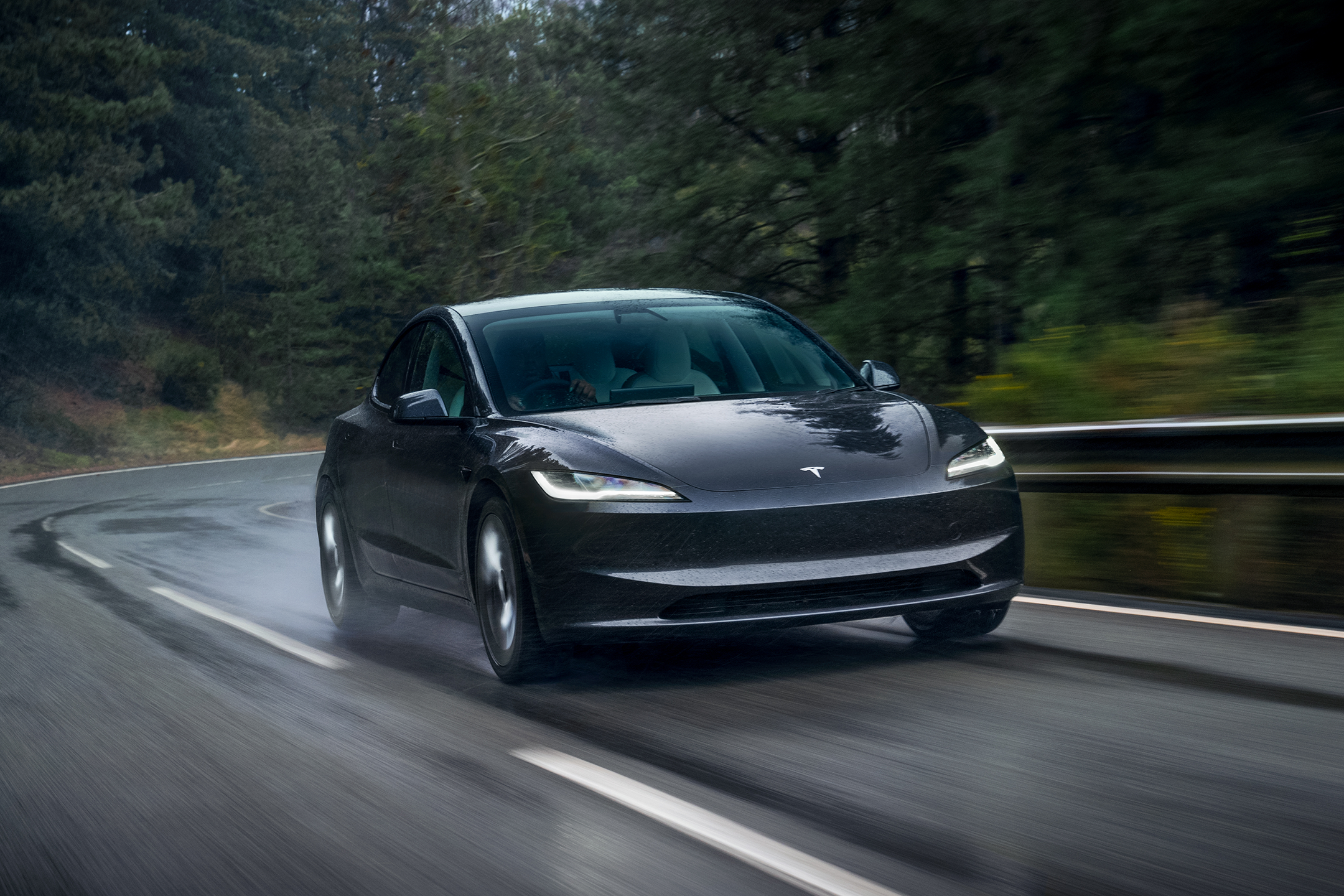
The Independent's Electric Vehicles Channel is sponsored by E.ON Next.
With pricing ranging from £15,000 to £2 million, the electric car market is bigger than ever, and today there are well over 100 different EVs available to buy new in the UK. Whether you want a small, city-friendly runabout, a family-friendly SUV or a sports car, there’s probably an EV for you – and thanks to improvements in battery and motor technology, they can drive further – and charger faster – than ever before.
Some of today’s EVs have official driving ranges of over 400 miles, while others can fill their battery to 80 per cent in under 20 minutes. Gone are the days plugging in for an hour or more every 100 miles. And, as we head through 2025 and beyond, all of these attributes will only improve; EVs will go further, charge quicker and cost less.
Prices for new EVs start at just £14,995 for the cheap and very cheerful Dacia Spring, with other brands offering big discounts and zero per cent finance offers (including Tesla) to make monthly payments more affordable – and, in many cases, cheaper even than petrol or diesel models.
Then there’s charging. On the road, there’s a new plug-in point being installed every 25 minutes, while smart charging from the likes of the E.ON Drive Next tariff can take your fuel bills down to about a quarter of that of an equivalent petrol model. Plug in at home and charge off-peak, and filling an EV can cost just £5.
But which EV should you buy? We’ve come up with a list of ten of the very best available new in 2025, covering every need and every budget.
How we tested
All our car testing starts with you in mind. We consider how you’re likely to use your electric car and what needs and priorities you might have.
We’re testing cars in real-world situations: parking them in car parks, filling them with shopping, fitting child seats, fiddling with the infotainment, turning the stereo up loud and driving them on a variety of roads in the UK and abroad,
We won’t be taking a family-friendly SUV around a race track, but we’ll take it along B-roads, around the M25 and into city centres. Then we run the numbers to compare buying and running costs with rivals so we can make a recommendation you can really trust.
The best electric cars in 2025
- Best overall – Tesla Model 3: From £39,990, Tesla.com
- Best budget EV – Dacia Spring: From £14,995, Dacia.co.uk
- Best seven-seat EV – Kia EV9: From £65,025, Kia.com
- Best sports EV – Hyundai Ioniq 5 N: From £65,000, Hyundai.com
- Best for range – Volkswagen ID. 7: From £51,550, Volkswagen.co.uk
1. Tesla Model 3: From £39,990, Tesla.com
Best: Overall
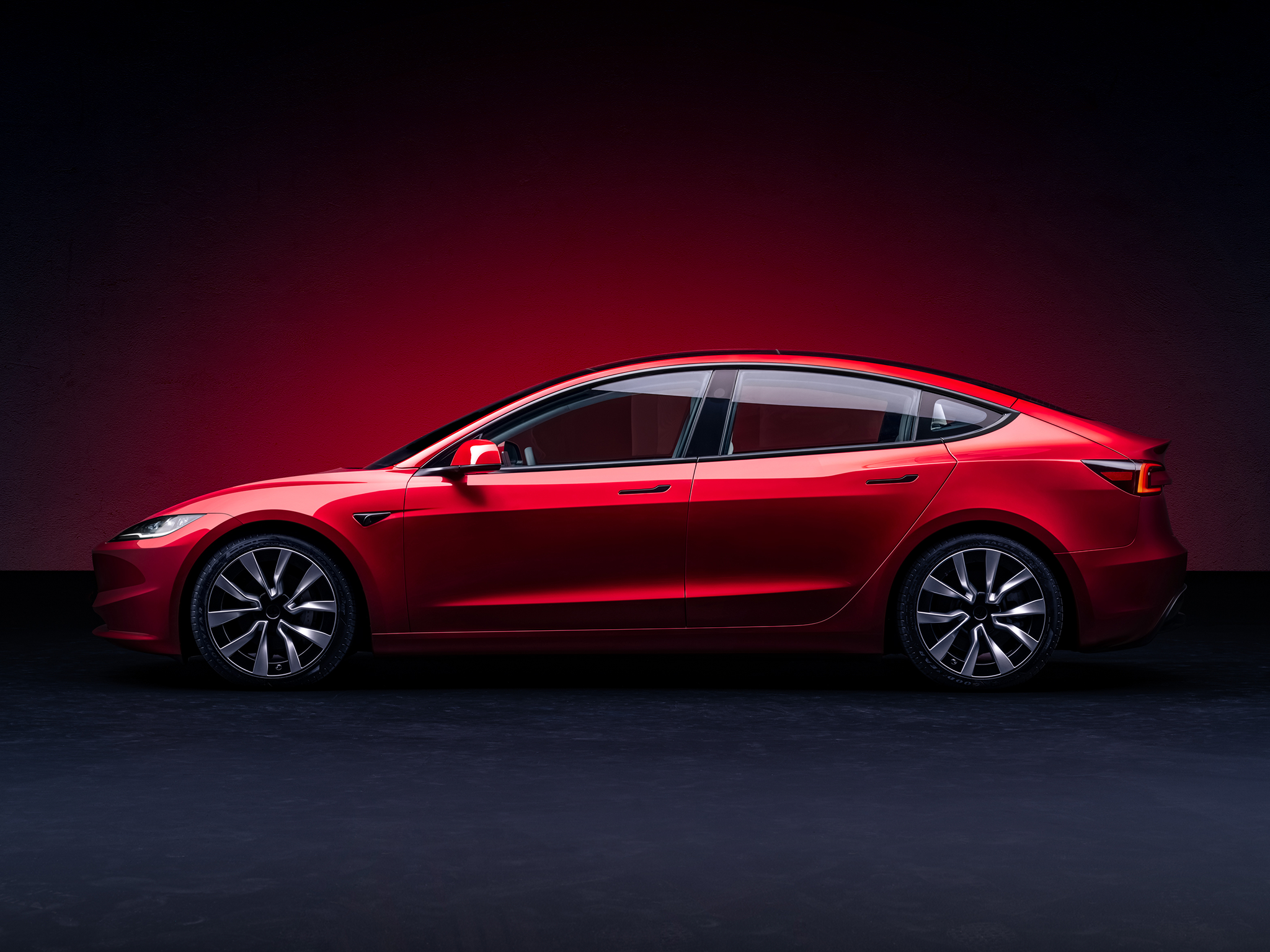
Independent rating: 10/10
- Pros: Brilliant tech, good to drive, efficient supercharger network
- Cons: No Apple CarPlay option
- Price range: £39,990 to £59,990
- Battery size: 60 - 75kWh (usable)
- Maximum claimed range: 436 miles
- Miles per kWh: 4.7
- Maximum charging rate: 170kW
- Charging cost per 100 miles on E.ON Next Drive: £1.47
The Tesla Model 3 has long been the model that every other EV is measured by. And the problem every other EV has is that the Tesla is not only brilliant, but costs from just under £40,000.
This year saw updates to the Model 3 that gave it a subtle, slightly more elegant look, improved quality – an old Tesla bugbear – and some of the most advanced EV tech in the market. That translates to more efficiency than ever with the Model 3 Long Range Rear-Wheel Drive boasting a 436-mile range and the Model 3 Performance getting from 0-60mph in 2.9 seconds.
The Model 3’s interior is spacious, but there’s not much in it – it takes minimalism to a whole new level with pretty much everything controlled via a touchscreen. It does all work well, though, although you’ll have to get used to using buttons on the steering wheel to indicate.
Read our full Tesla Model 3 review
The latest upgrades also mean the car is more comfortable over lumps and bumps, especially – bizarrely – the performance model, which gets adaptive damping. And even the cheapest model will do 318 miles between charges and can get from 0-60mph in 5.8 seconds. Every model comes well equipped with only non-white paint, wheels, interior trim and self-driving tech optional.
What every Tesla owner does get is another killer feature – access to the brilliant and fast Tesla Supercharging network.
Tesla isn’t averse to the odd deal, either, with zero per cent finance popping up now and again. But as with all Tesla deals, they can come and go rather randomly.
2. Dacia Spring: From £14,995, Dacia.co.uk
Best: Budget EV
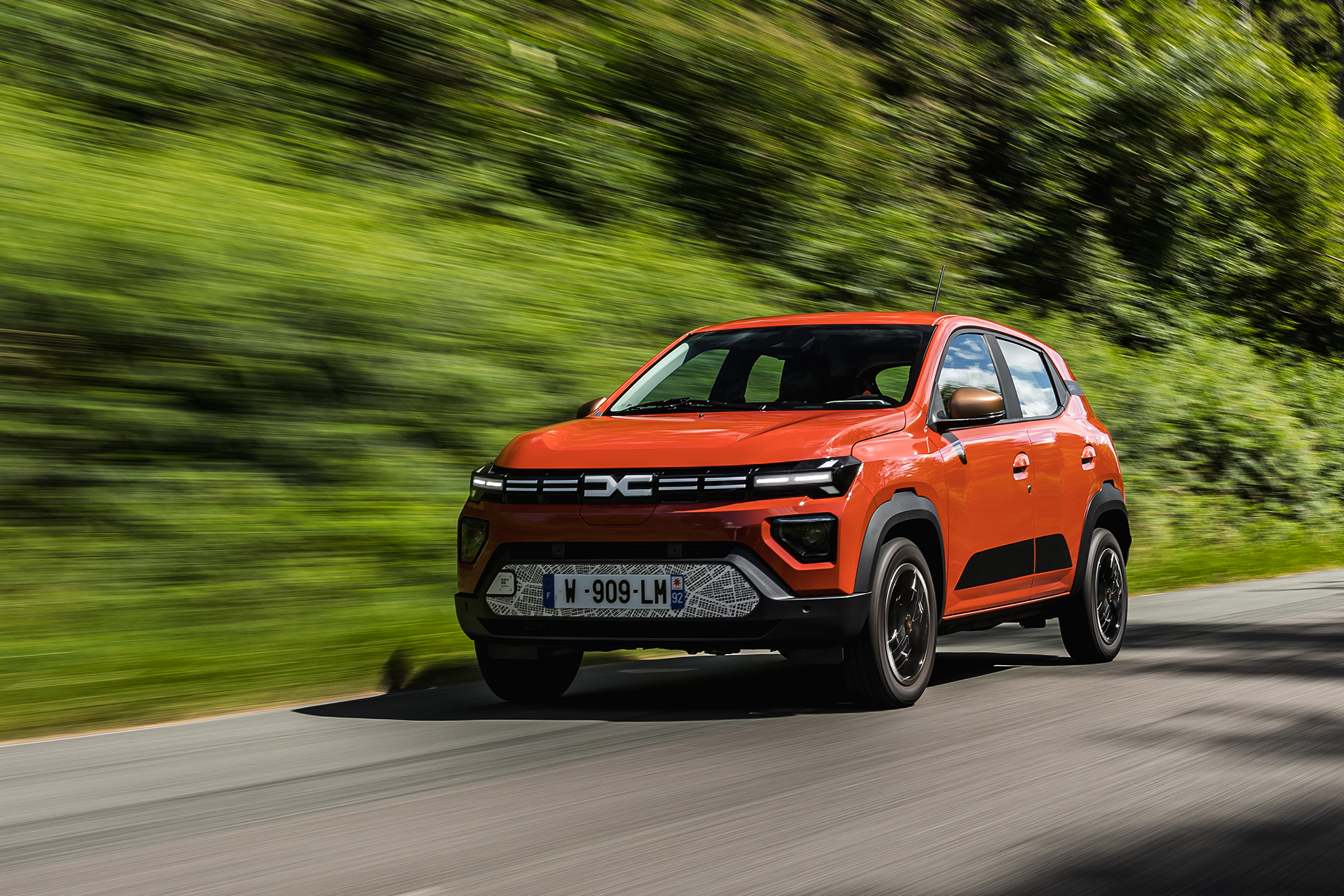
Independent rating: 8/10
- Pros: Price, clever warranty
- Cons: Slow, restrictive range, small cabin
- Price range: £14,995 to £16,995
- Battery size: 26.8kWh (25kWh usable)
- Maximum claimed range: 140 miles
- Miles per kWh: 4.4 (claimed)
- Maximum charging rate: 30kW DC (64bhp model only)
- Charging cost per 100 miles on E.ON Next Drive: £1.52
While many brands still fail to offer electric cars for less than £25,000 or even £30,000, Renault-owned Dacia has performed an undercutting masterclass by pricing its new EV, called the Spring, from just £14,995.
It’s already been a smash hit across continental Europe, and we see little to believe it won’t be a success with UK customers too. It’s another typically well-judged vehicle from Dacia, in fact, with no real frills but just enough of what most people will need in daily use. As such, the interior has space for two adults and two children, the boot is big enough for a week’s groceries and, while the range and charging speeds aren’t exactly set up for long-distance cruising, they are perfectly acceptable for suburban use.
Read our full Dacia Spring review
To that end, the Spring has a claimed maximum range of 140 miles, and although the battery charges much slower than most rivals, its small capacity of just 25 kWh means it’ll fill from empty using a home charger in about five hours. You can even feasibly charge it up using a a regular, three-pin wall socket, with a complete charge taking around 11 hours.
Our pick of the two options is the slightlymore expensive Dacia Spring Extreme, since it costs only an extra £2,000 but includes 10in dashboard display (where the base model goes without), plus Apple CarPlay and Android Auto. It’s also quicker and more powerful than the base car.
3. Kia EV9: From £65,025, Kia.com
Best: Seven-seat EV
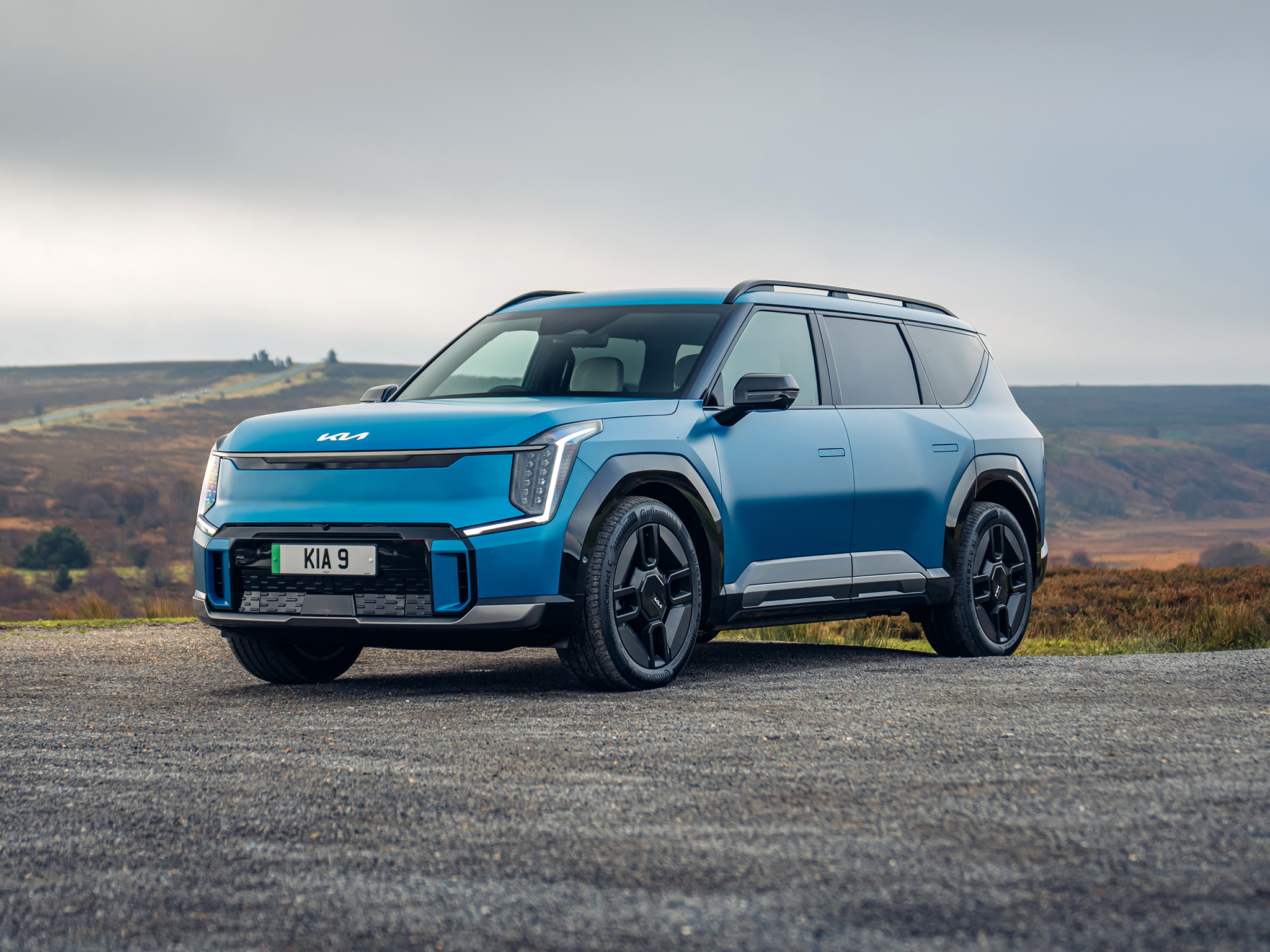
Independent rating: 7/10
- Pros: Spacious interior, good range and fast charging, one of very few seven-seat EVs
- Cons: Feels very big when driving, heavy, interior materials could be better
- Price range: £65,025 to £77,025
- Battery size: 99.8 kWh
- Maximum claimed range: 349 miles
- Miles per kWh: 3.1
- Maximum charging rate: 210 kW
- Charging cost per 100 miles on E.ON Next Drive: £1.82
Kia may be seen by many as a mainstream brand, but the EV9 is proof that it’s moving towards the premium end of the market. This big, seven-seat SUV is the first of its kind to go on sale, beating the Volvo EX90 and Range Rover. And yes, it can be considered alongside those brands, the quality is that good.
The futuristic look of Kia’s EVs sits happily on its largest model, but there’s no denying this is a big, heavy car – which has an impact on its electric range and performance, although a claimed range of 349 miles from its huge 99.8kWh battery will be okay for most people. The EV9 gets handy fast-charging tech, too, so if you find the right charger you can add 154 miles in just 15 minutes.
It’s the spacious and airy interior that really marks the EV9 out, though, with plenty of usable tech without overloading the driver. There’s decent space for all seven passengers, while many of the interior fabrics are made from recycled materials.
And the EV9 hides its bulk on the road, too – the view out is great, while a host of cameras make things easier when parking. It’s a comfortable cruiser, quiet with a nice ride that isn’t too bumpy and – thanks to the square shape – surprisingly easy to manoeuvre around town.
4. Hyundai Ioniq 5 N: From £65,000, Hyundai.com
Best: Sports EV
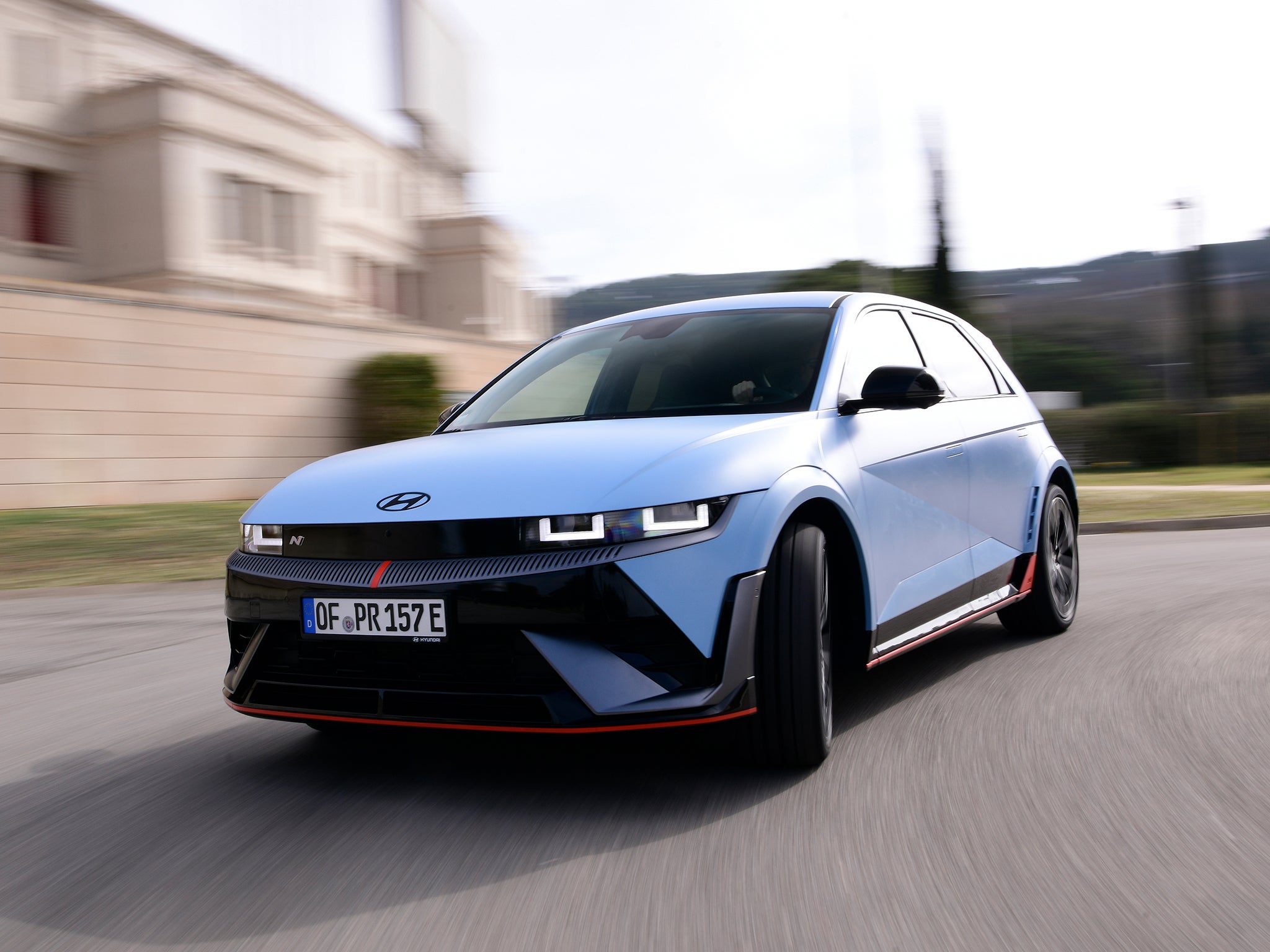
Independent rating: 9/10
- Pros: Huge performance, simulated gearbox is surprisingly good, spacious interior
- Cons: Bigger than it looks, heavy, tech can feel overwhelming
- Price range: £65,000
- Battery size: 84 kWh
- Maximum claimed range: 278 miles
- Miles per kWh: 2.93
- Maximum charging rate: 240 kW
- Charging cost per 100 miles on E.ON Next Drive: £2.35
Most electric cars are quick in a straight line, but can they handle like a sports car, too? The Hyundai Ioniq 5 N proves that they can – few cars, whether electric or not, can put a smile on your face like this one.
In a short space of time, Hyundai’s N division has proven that it can deliver proper sports cars that can be mentioned in the same breath as Volkswagen GTIs and Rs, Audi RS models and BMW M cars. It’s not surprising, really, as former BMW M boss Albert Biermann is the man responsible for the hot Hyundais, honing them at the company’s bases at Germany’s infamous Nürburgring race track and Hyundai’s own Namyang R&D centre – the latter gives the N brand its name.
Read our full Hyundai Ioniq 5 N review
This car is quick, the steering is super-sharp, the handling is safe and secure meaning you can throw it through bends at surprising speeds and there’s all the measuring tech on board today’s hot hatchback fans love.
Then there’s the noise – you can either just listen to the holistic whirring and cracking from the electric motor or turn on the electronically generated sounds that mimic revs rising and even the pops and bangs of a sports exhaust. It might sound a bit Playstation, but it actually adds to the whole experience, making your grin even wider. And as with all great hot hatchbacks, there’s a sensible side to the Ioniq 5 N – it’ll double up as a sensible and comfortable family car when it’s not at the race track.
5. Volkswagen ID. 7: From £51,550, Volkswagen.co.uk
Best: For long range
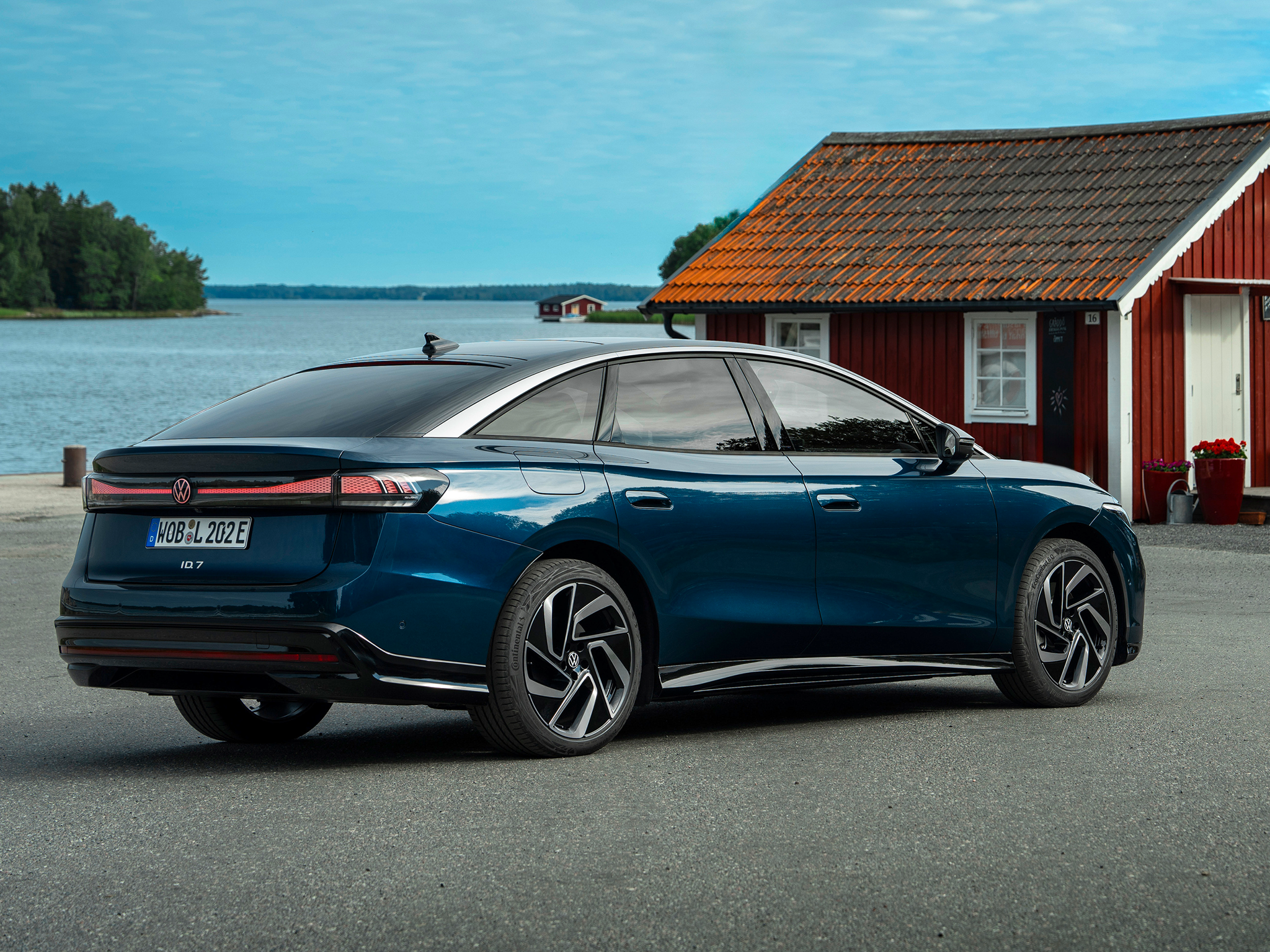
Independent rating: 8/10
- Pros: Long range, smooth ride, loads of space
- Cons: Dull looks, infotainment not great
- Price range: £51,550 to £61,980
- Battery size: 77kWh to 86kWh
- Maximum claimed range: 365 to 436 miles
- Miles per kWh: 4.5
- Maximum charging rate: 170kW
- Charging cost per 100 miles on E.ON Next Drive: £1.52
If it wasn’t for the Tesla Model 3, the Volkswagen ID. 7 would be much higher up this list. It’s a great looking 5-door – even better in Touring (VW-speak for estate) form – that’s strong on space, comfort, range (where it even beats Tesla) and tech.
Most EVs are quiet, but the ID. 7 takes it to a different level – it’s super-silent on the motorway where the soft suspension makes it a great cruiser. There’s plenty of tech on board, including voice control that uses Chat GPT to respond to your questions, but it’s all controlled through Volkswagen’s stupidly fiddly and laggy infotainment screen.
And although there are a few models to choose from with different batteries, the ID. 7 suffers the same fate as so many other EVs – the Tesla Model 3 is just cheaper and better.
Read our full Volkswagen ID.7 review
That said, if range is what you want most from your EV, then the Volkswagen ID. 7 should definitely be on your shopping list, especially with some of the leasing deals we’ve seen the car offered at recently. Go for the Pro S Match model and the claimed range is a whopping claimed 436 miles – way ahead of what a Tesla Model 3 will give you.
The ID. 7 is also a clear indication that Volkswagen – at last – is on the right path when it comes to EVs. It may be dull to look at, but its talents are thankfully more than skin deep. There are two other areas where the ID. 7 really stands out, as well as the range, and they both come under the heading of comfort. There is loads of space in the back seats, while the ride is truly limo-like – it feels more like a Mercedes than many Mercedes models do these days.
6. Polestar 3: From £69,900, Polestar.com
Best: For sustainability
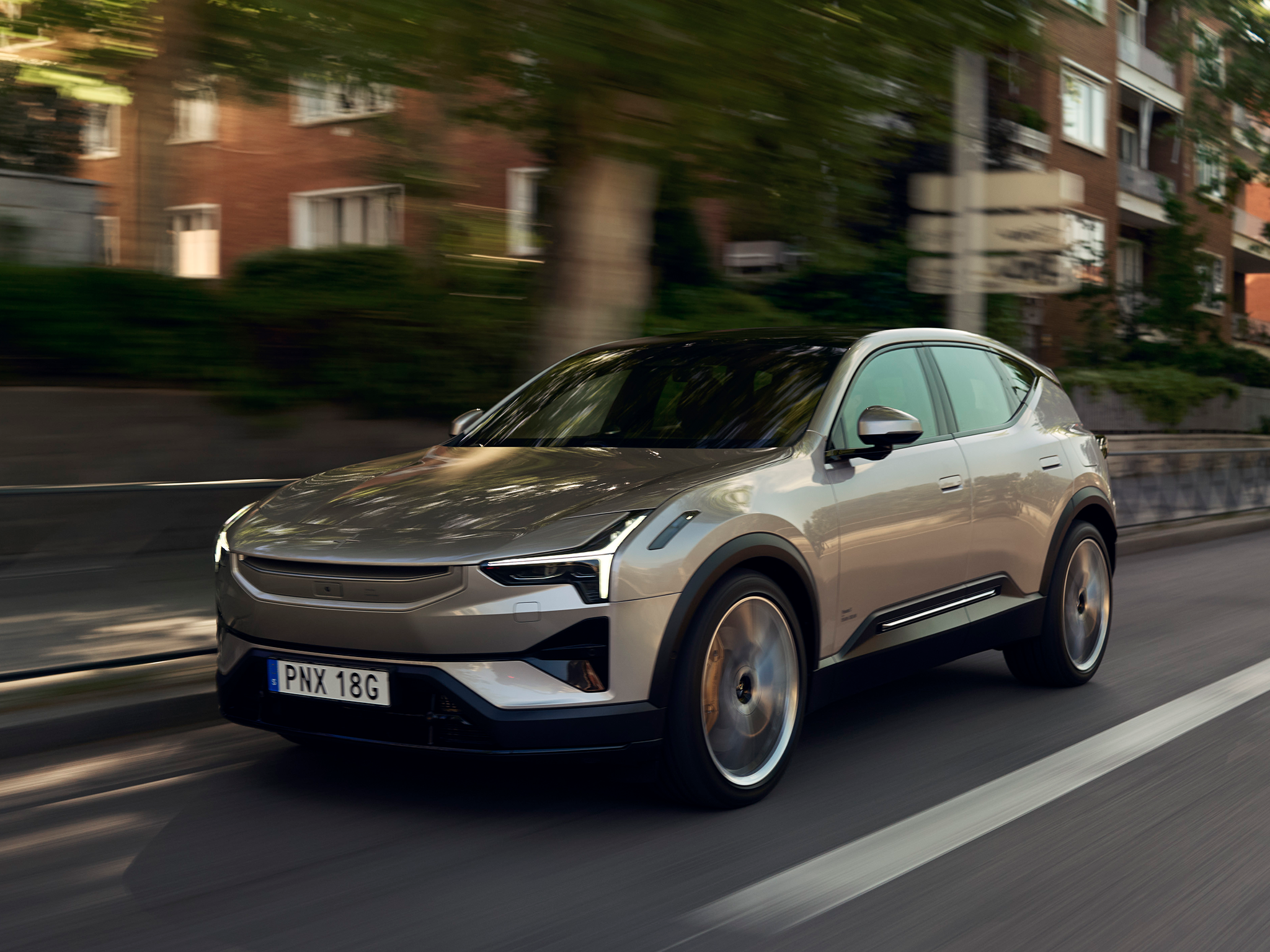
Independent rating: 8/10
- Pros: Fun to drive, spacious interior, lots of kit fitted as standard
- Cons: Lack of physical controls can be annoying, no seven-seat option
- Price range: £69,900 to £81,900
- Battery size: 111 kWh
- Maximum claimed range: 403 miles
- Miles per kWh: 3.3
- Maximum charging rate: 250W
- Charging cost per 100 miles on E.ON Next Drive: £2.09
The Polestar 3 is a full-size SUV with a big battery and, if you’re gentle on the accelerator, a real-world range closing in on 350 miles. It also benefits from fast charging, a roomy and stylish interior packed with kit as standard, and an on-road poise that will please keen drivers. It’s not a sports car by any stretch of the imagination – and you’re best off buying the least powerful model in return for maximum range – but the 3 goes well and feels composed, even nimble, for its size. Thankfully, it rides far better than the overly-stiff Polestar 2. It’s properly impressive, even on our broken British roads.
Polestar’s interior tech is among the best, but some buyers might be frustrated by the lack of physical controls for key functions like the cabin temperature and mirror adjustment, while others will admire the clean and tidy Android interface. Optional extras are bundled into packs, which can quickly get expensive (especially if you just want the excellent Bowers & Wilkins stereo), but the 3 still feels like good value compared to rivals from the better-known German brands.
Read our full Polestar 3 review
The Polestar 3’s cavernous interior has seating for five (not seven, unfortunately) and is a masterclass in minimalism. Volvo fans will recognise some of the switchgear, which is no bad thing, and the 3 is fitted with recycled ‘WeaveTech’ fabric as standard. Nappa leather is available as an upgrade with the Pilot and Plus packs; the latter also includes active noise cancelling to reduce road noise, a head-up display, heated rear seats (on the fronts are heated as standard) and the phenomenalB&W sound system, complete with Dolby Atmos surround sound.
7. Porsche Taycan: From £86,500, Porsche.com
Best: For luxury

Independent rating: 9/10
- Pros: Extremely fast charging, good range, outrageous performance in Turbo S guise
- Cons: Expensive optional extras, cramped back seats, depreciation
- Price range: £86,500 to £186,300
- Battery size: 89 to 105 kWh
- Maximum claimed range: 394 miles
- Miles per kWh: Up to 3.72
- Maximum charging rate: 320 kW
- Charging cost per 100 miles on E.ON Next Drive: £1.80
Porsche’s first EV received a big technical upgrade in 2024, giving the Taycan more power, a greater range and faster charging. It now fills its batteries quicker than almost any other EV, while boasting clever active suspension and, should you have a big budget, acceleration to rival any supercar.
The Porsche Taycan is also a sensible and practical four-door saloon with a high-quality interior, smart infotainment and decent but not segment-leading storage.
Read our full Porsche Taycan review
The rear seats can feel cramped for taller adults, but from the front row the Taycan is a wonderful place to spend many miles. We’re big fans of the elongated estate styling of the Cross Turismo and the extra practicality it brings, while the 4S powertrain gives you all the performance you’ll need without the massive cost of the Turbo.
The recent facelift has done wonders to the Taycan’s spec sheet. It now has much more range than before and charges quicker than almost any other EV on the road today. Expensive, but a triumph of engineering.
Short-term residuals are a concern among luxury EVs and the Taycan is no exception, but depreciation tends to stabilise quickly after the first year of ownership.
8. Renault Scenic E-Tech: From £37,495, Renault.co.uk
Best: Family EV
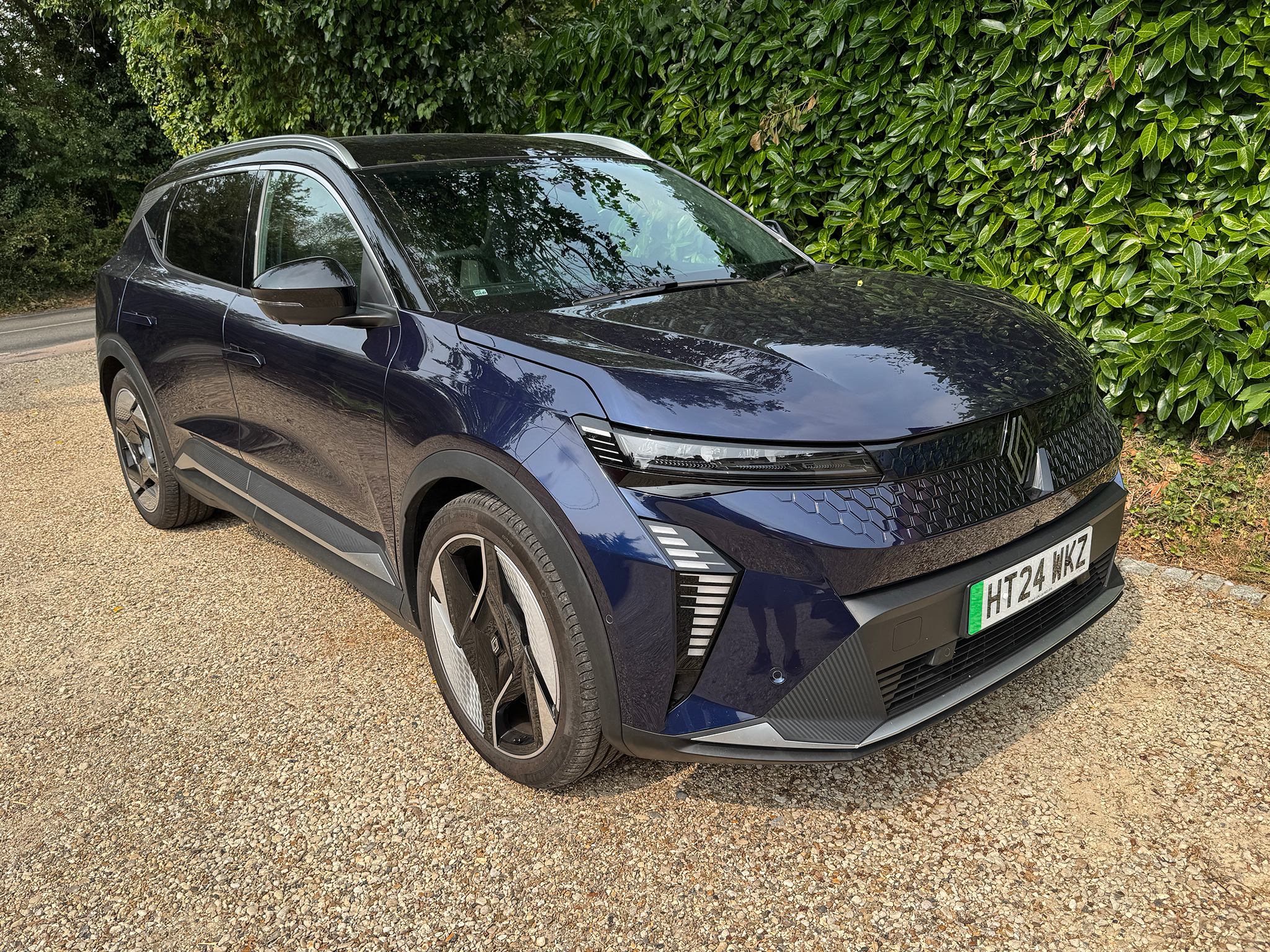
Independent rating: 8/10
- Pros: Long range, family-friendly interior, strong tech
- Cons: Expensive, lumpy ride, interior quality
- Price range: £37,495 - £45,495
- Battery size: 60kWh & 87 kWh
- Maximum claimed range: 379 miles
- Miles per kWh: 3.8
- Maximum charging rate: 150kW
- Charging cost per 100 miles on E.ON Next Drive: £1.82
The new all-electric Scenic may not be as ground-breaking as the original small MPV, but its reinvention as a mid-size SUV hasn’t been without success – it’s the current European Car of the Year. Do we agree with the esteemed jury? Yes and no.
The Scenic is pretty mediocre to drive with a firm ride and lacking the pizazz of so many electric cars. Some of the interior plastics feel decidedly cheap, too.
Read our full Renault Scenic E-Tech review
But there are plenty of clever touches that will please the driver and passengers. A brilliant Google-powered touchscreen with excellent voice control is the star tech attraction, but anyone in the back will be in awe of the ‘ingenious armrest’ which not only includes the obligatory cup-holders, but clever fold-out holders for tablets or smartphones – complete with power sockets. There’s decent space in the back, too.
There’s also a long-range version with a handy 379-mile driving range although the Scenic prices aren’t quite so handy, starting at £37,495 for the 260 mile Comfort model going up to the range topper at £45,495 – putting it very much in Tesla territory.
9. Mini Aceman: From £31,800, Mini.co.uk
Best: For small families
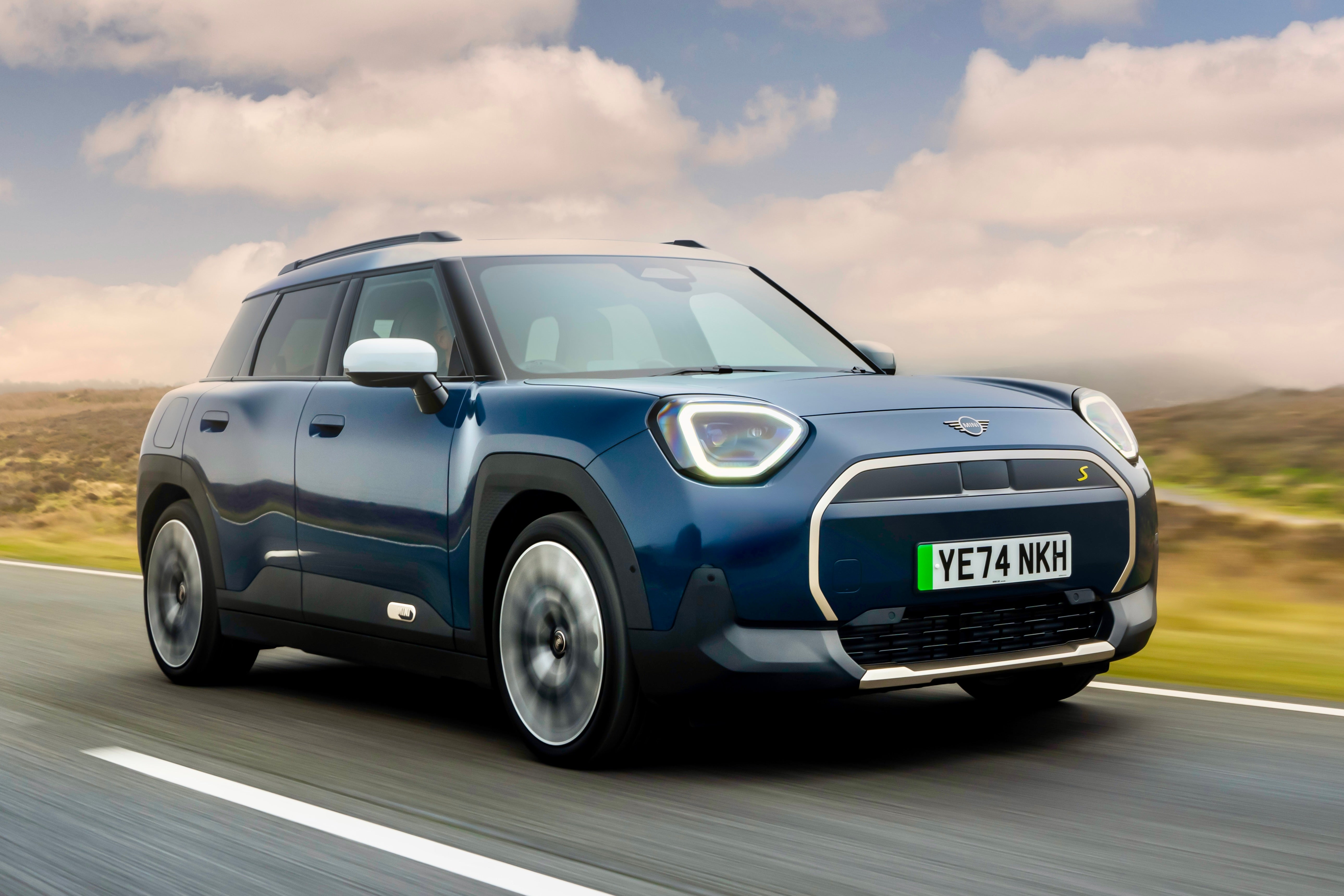
Independent rating: 7/10
- Pros: Characterful design, strong efficiency, good value
- Cons: Mediocre charge speeds, steep infotainment learning curve, some hard interior plastics
- Price range: £31,800 to £41,350
- Battery size: 38.5 kWh or 49.2 kWh
- Maximum claimed range: 192 to 252 miles
- Miles per kWh: 4.2 to 4.5 (claimed)
- Maximum charging rate: 70 or 95 kW
- Charging cost per 100 miles on E.ON Next Drive: £1.49
Only slightly more expensive than the much smaller Cooper, the new Aceman is a strong EV option for small families. It’s fun to drive and is packed with all of the charm and character we love in the Cooper and even larger Countryman, while being more comfortable than the former and far more affordable than the latter.
The interior is a particular highlight, thanks to the circular OLED touchscreen display and all-new infotainment system that, while a little intimidating at first, works very well.
Read our full Mini Aceman review
It isn’t especially quick (and we wish it charged a little faster), but there’s still plenty of acceleration from low speed to feel nippy in traffic, and we think the styling is a triumph, blending classic Mini aesthetics with futurist minimalism.
If you’ve outgrown the Cooper but don’t need the much larger (and more expensive) Countryman, the all-new Aceman adds competitively-priced practicality to the classic Mini recipe.
10. Renault 5: From £22,995, Renault.co.uk
Best: For affordable fun

Independent rating: 9/10
- Pros: Comfortable drive, in-car tech, retro charm
- Cons: Performance lacks the pizzazz of the exterior, wind noise, grabby brakes
- Price range: From £22,995
- Battery size: 40 & 52kWh
- Maximum claimed range: 250 miles
- Miles per kWh: 4.17
- Maximum charging rate: 100 kW
- Charging cost per 100 miles on E.ON Next Drive: £1.61
Quite simply, the Renault 5 E-tech is one of the best cars of 2024. It is well priced and well equipped; it looks fantastic, with a lovely interior and great ride quality. It is also supremely comfortable for a car in this class, with loads of retro charm and a Google-powered infotainment system that works brilliantly.
Read our full Renault 5 review
It isn’t especially quick – you can always go for the sportier, pricier and closely related Alpine A290 if that’s a concern – but the 5 is still a fun car to drive. It is particularly good around town, where we imagine most 5s will live, but it’s also fairly civilised on the motorway, too, although wind noise does ramp up (and efficiency falls) at higher cruising speeds.
Although easy and enjoyable to drive, we wish the steering wheel wasn’t quite so cluttered by stalks, and we’d rather the car had a Park gear, instead of asking for neutral, followed by a pull of the electric handbrake. It’s a small criticism though, for what is otherwise a fantastic car.
Electric car FAQs
When should I make the switch from petrol or diesel to electric?
Think about the journeys you do and whether you could live with an EV, as well as when and how you would charge it. Let’s put it this way, many people buy an EV as their second car and it quickly becomes their main vehicle.
How do EVs compare to petrol and diesel cars?
They’re cheaper to run, quieter and quicker, while the tech is often better. The biggest change is availability and time taken for ‘fueling’. If you’ve got home charging, you can just charge overnight and it’ll be cheaper, but public charging will take longer than just pulling in to a fuel station.
How do EVs compare to hybrid cars?
Full hybrid cars can run on electric power for a very short period of time before a petrol engine kicks in. EVs run on electricity full time – they tend to be quicker and quieter, too.
How does home EV charging work?
It’s simple – you have a home charger installed and pay for electricity for charging on your electricity bill. Get on a smart energy tariff like E.ON Next Drive and you can save money on overnight charging.
How does public EV charging work?
You can just plug and pay with a tap of your card these days, or you can have an account via an app. There are different speeds of chargers that will charge your car in different times; faster chargers are more expensive to use
The verdict: Electric cars
New EVs are coming thick and fast with more choice available for every car buyer. We’re seeing improved ranges, the very latest tech and higher quality. The cars are getting more comfortable, and prices are coming down, especially if you look at some of the lease deals available.
Our pick of all EVs is the Tesla Model 3. It’s so good it’s a real thorn in the side for other car makers. Not only is it a great EV that’s got a good range, is great to drive, has space for all the family and the best tech you can get, there’s also the benefit of Tesla’s bespoke Supercharger network. And all that at a price that makes other EV makers wince.
That’s not to say there aren’t plenty of other outstanding EVs out there. We love the sheer affordability of the sub-£15,000 Dacia Spring, for starters. Or there’s the current World Car of the Year, the Kia EV9: a handsome car with a whiff of Range Rover about it, but with superb build quality, strong sustainability credentials and plenty of space for seven people.
Another Korean car will be most likely to put a smile on your face: the Hyundai Ioniq 5 N. It’s a modern-day hot hatchback that blends great fun (especially with the great sounds it makes) with a dose of practicality. It’ll carry five people and plenty of luggage, and is as happy at the shops as on a track day.
There are cheap EVs, luxury EVs, EV family cars and EV vans - with new EVs being launched every month. It really is a great time to buy an electric car.






Join our commenting forum
Join thought-provoking conversations, follow other Independent readers and see their replies
Comments